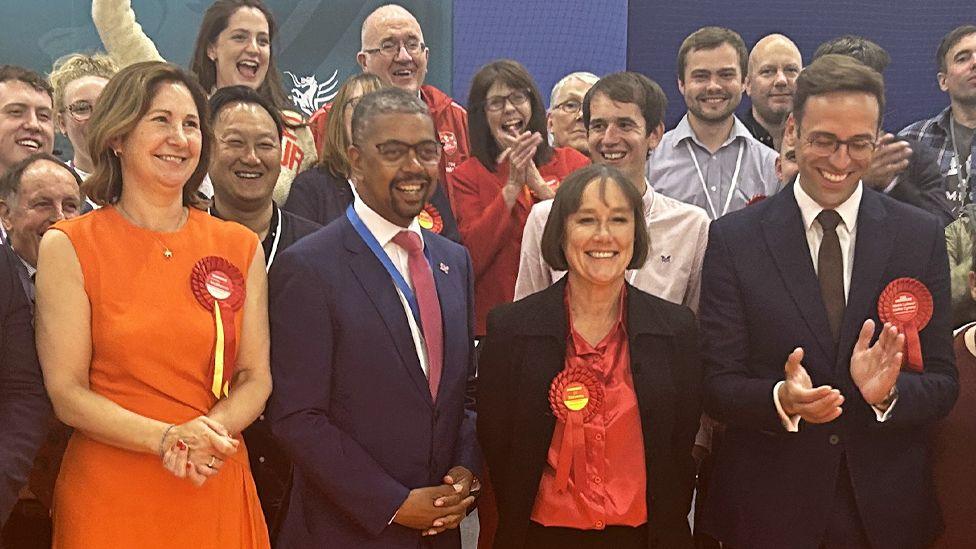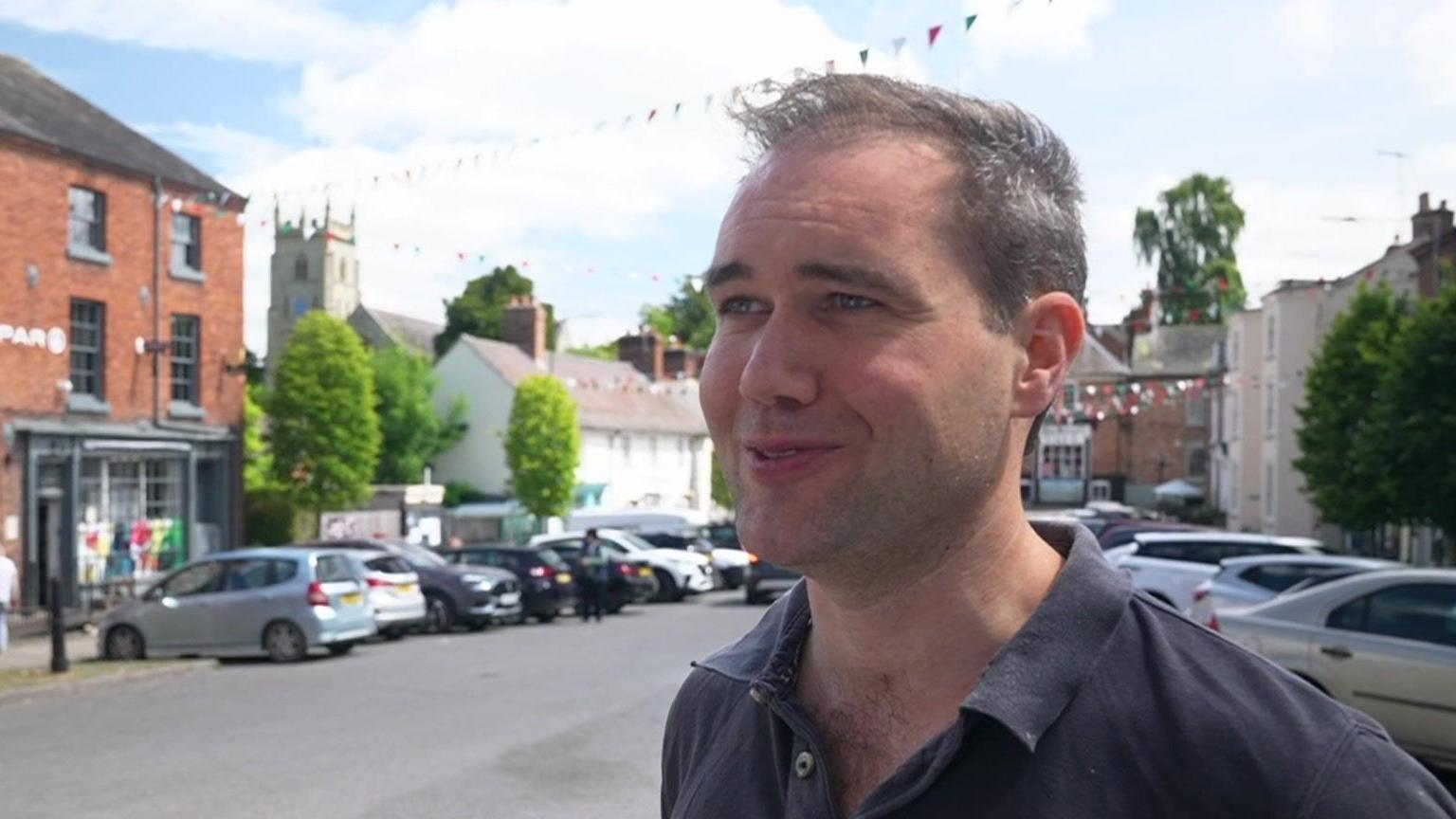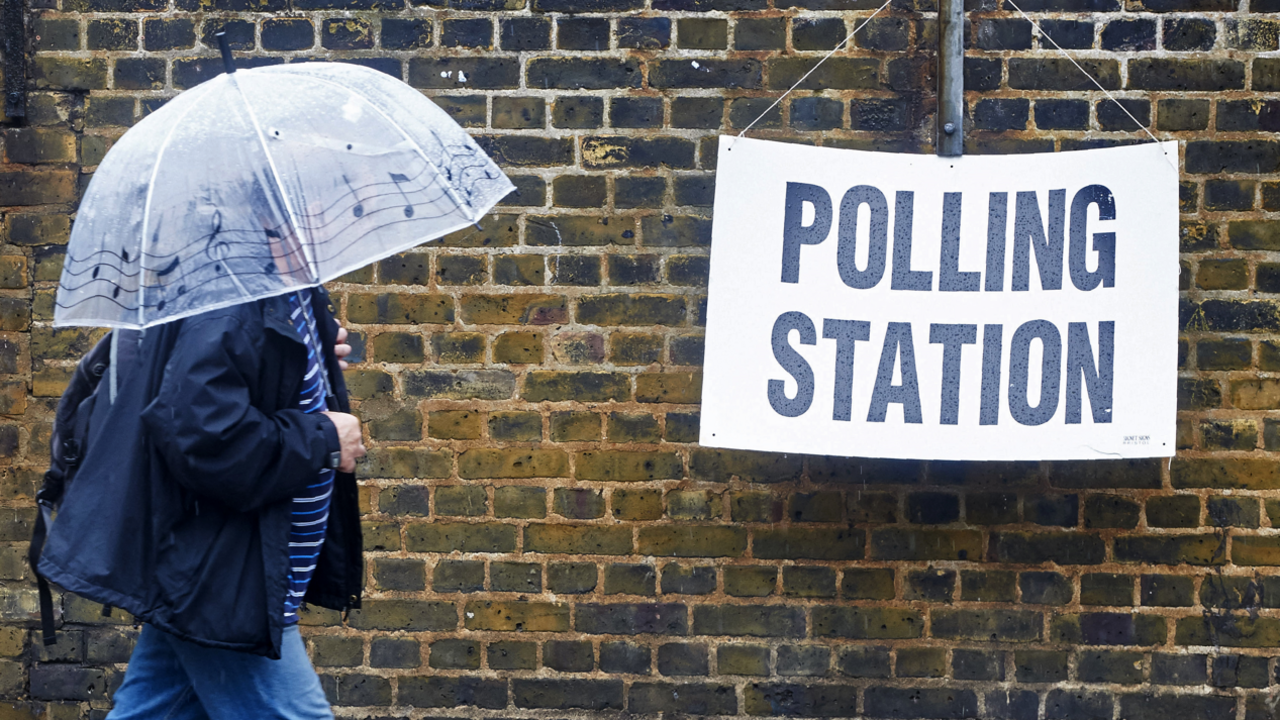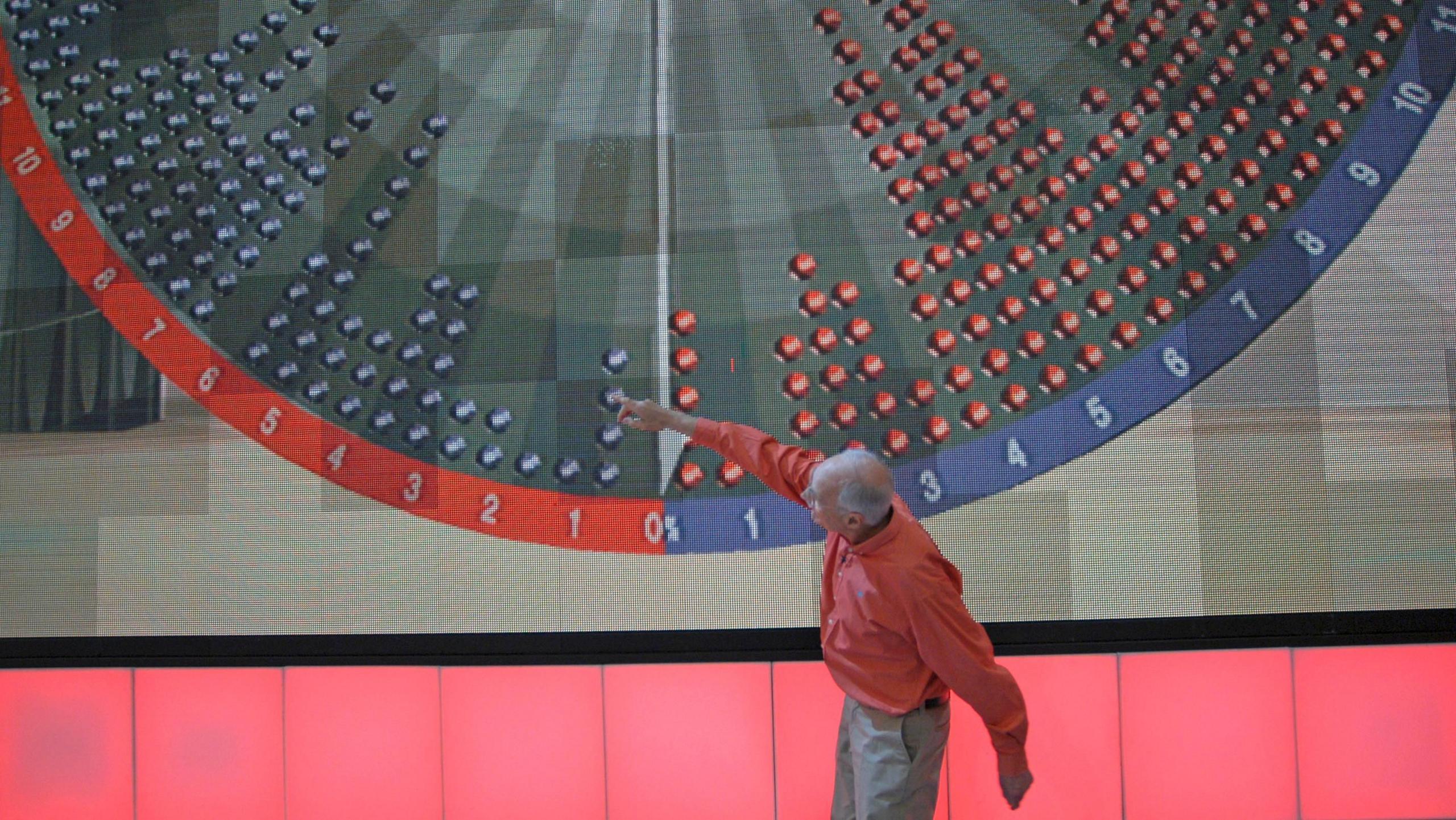Resurgent Labour wins Welsh seats back from Tories

Wales' First Minister Vaughan Gething with winning Labour candidates and supporters at the count in Cardiff
- Published
Labour has won back a string of Welsh seats from the Conservatives, as Sir Keir Starmer's landslide election victory was confirmed.
The Tories were wiped out in Wales, with Welsh Secretary David TC Davies losing his seat, as well as the three former Welsh secretaries, Alun Cairns, Stephen Crabb and Simon Hart.
Labour finished on 27 seats, up nine on 2019, Plaid on four and the Lib Dems one.
Cardiff East MP Jo Stevens was later confirmed as the new Welsh secretary.
Another ousted Tory was Craig Williams, former aide to Rishi Sunak, who had party support withdrawn after admitting betting on the date of the election.
On a triumphant night for Labour, and a disastrous one for the Tories, Plaid Cymru celebrated winning both its target seats of Ynys Môn and Caerfyrddin from the Conservatives.
There was good news for the Liberal Democrats, who took back Brecon, Radnor and Cwm Tawe seat from the Conservatives, removing Wales Office minister Fay Jones from parliament.
It means the Lib Dems have a Welsh MP for the first time since 2019.
Labour won back Bridgend, Monmouthshire and Wrexham and also took the new seats of Bangor Aberconwy, Clwyd North, Clwyd East, Montgomeryshire and Glyndŵr and Mid and South Pembrokeshire from the Conservatives.
A roundup of what happened in the general election in Wales
Labour held Swansea West, with a win for new candidate and Starmer ally Torsten Bell, widely seen as ripe for early promotion in the new government expected to take power on Friday.
Labour retained Gower, Pontypridd, Torfaen, Caerphilly, Newport East, Aberfan Maesteg, Rhondda and Ogmore and Cardiff South and Penarth.
The party also kept control of Alyn and Deeside, Llanelli, Cardiff West, Cardiff East, Merthyr Tydfil and Aberdare and the Blaenau Gwent and Rhymney constituency.
Labour's Kanishka Narayan became the first ethnic minority Welsh MP, in the Vale of Glamorgan.
The Tories were reduced from 14 seats in Boris Johnson's 2019 election victory to none under Rishi Sunak.
Labour, with the help of Plaid Cymru, saw the Tories fall to zero seats in Wales on Friday for the first time since 2001.
But Labour also saw its vote share fall to 37%, from 40.9%.
They have been badly damaged by the performance of Nigel Farage's Reform UK, which split the right-wing vote and came second in a series of seats.
Plaid Cymru hugely increased its majority in Ceredigion Preseli and easily retained Dwyfor Meirionnydd, finishing the night on four seats.
The six biggest election moments in Wales
- Published5 July 2024
Tories suffer first Welsh wipeout since 2001
- Published5 July 2024
Mr Davies, who had represented Monmouth since 2005 (now called Monmouthshire after boundary changes) , is the first Welsh secretary to lose his seat while in office since the post was created in 1964.
"I've had great support from the local association, but the fact is, people wanted a change," he said. "That's the way it goes in democracy."
Welsh Conservative Andrew RT Davies apologises
He urged Conservatives to "stay calm" and not blame each other for expected poor result.
Leader of the Welsh Conservatives Andrew RT Davies said he was “bloody angry” following the result.
“We have had a very, very bitter blow to us at the general election,” he said.
He insisted voters had “warmed” to the work the Conservatives were doing in Senedd and blamed his party’s defeat on the “national messaging and national picture”.
When asked how she felt about becoming the new Welsh Secretary, Shadow Welsh Secretary Jo Stevens said we "shouldn't assume anything until Keir Starmer becomes prime minister today and starts to make his appointments".
She said the new Labour UK government would "work in partnership with the Welsh government".
"Having two Labour governments, one at each end of the M4, working in an atmosphere of trust and respect and collaboration rather than constant frictions means that we will deliver better outcomes for Wales," she said.
BBC Radio Wales also asked her about calls to give Wales billions of pounds off the back of HS2, which is designated an England and Wales project despite ending in Birmingham.
She responded: “I cannot make unfunded spending commitments. I would absolutely love to magic up billions or millions of pounds but it’s impossible and anyone suggesting otherwise is indulging in fantasy promises.”
Sir Robert Buckland, Welsh secretary under Boris Johnson and Liz Truss, became the first Conservative in the UK to lose his seat on the night, ousted in Swindon South by Labour’s Heidi Alexander.
The Llanelli-born Tory replaced Simon Hart in the Wales Office in 2022 in Mr Johnson's government, and was kept in the post by Ms Truss.

"Keir looked like he really enjoyed the campaign," says Labour's Jo Stevens
Sir Robert said UK politics was at a "crossroads", and asked "do we value those who work to bring people together" or "shrug our shoulders and accept that politics is a mere circus".
He also criticised Rishi Sunak’s national service policy, which he said was “totally over-sold” to appeal to “a more populist base”.
“That’s a mistake, I’m fed up, the time has gone for cheap populism”.
The former Labour leader and ex-Islwyn MP Lord Kinnock told ITV News the Labour landslide was "the greatest comeback since Lazarus".

Tory Senedd group leader Andrew RT Davies said he was "angry" about the party's election campaign.
"I have no words that can describe my frustration at some points in the campaign," he told the BBC Wales results programme.
Some of his fury was directed at Rishi Sunak's decision to call the general election on 22 May.
"No one really understood why we were sitting here tonight instead of the autumn."
He said that an autumn poll would have been difficult still, but the party needed the "best possible chance".
"You'll see my anger at the Welsh (Conservative) Party board meeting," he said, suggesting Tories had paid the price of "the shenanigans over the past five years".
Reform received 223,018 votes in Wales, just 16,985 behind the Conservatives.
This makes it the party with the third largest share of votes in Wales and they also came in second place in 13 of Wales' constituencies.
Reform candidate for Montgomeryshire and Glyndŵr, Oliver Lewis, said the first past the post electoral system needed to change after the party gained no seats in Wales.
"You're fighting an entrenched issue with our electoral system which is desperately unfair," he said.
He predicted the party could get between 20 and 25 seats at the 2026 Senedd election, where two distinct electoral systems, external (first past the post and the additional member system) are applied to decide who wins.
He also strongly criticised the media for reporting on the behaviour of what he called “a few deviant candidates” in his party.

Oliver Lewis is critical of the first past the post electoral system
Responding to questions about Nigel Farage’s views on Vladimir Putin and allegations of racist comments by candidates, he said people "see through" the negative press "which institutions like the BBC give us".
The "vast majority of our candidates are centrist and sensible," he said.
He said: "To come second place from a standing start in 40 constituencies is absolutely terrific.”
"I’m ecstatic to have beaten Craig Williams into second place and put the conservatives into third place."
Wales had 40 MPs in the last parliament but that drops to 32 seats at this election, following a review aimed at equalising the size of UK constituencies.
Plaid Cymru leader Rhun ap Iorwerth said winning for seats in Wales was a “historic result” for his party.
“This is Wales, not just Plaid Cymru, saying to the new Labour government ‘you cannot ignore us or cast us aside’,” he said.
Ann Davies, the new Plaid Cymru MP for Caerfyrddin took the seat from Conservative chief whip Simon Hart - who finished third.
"I am delighted beyond words that we’ve won this," she told BBC Radio Wales.
"Every party has a lot of work to do but this is a fantastic platform on which to build."
Jane Dodds, Welsh Liberal Democrats leader said the party was "very very pleased we’re back on the electorate map" with David Chadwick's win in Brecon, Radnor and Cwm Tawe.
The Green party won four seats across the UK but none in Wales.
Anthony Slaughter, leader of the Wales Green Party and Green candidate for Cardiff South and Penarth, said he "will get double figures next time".
He added that the party got 15 second places, one of which being Cardiff.
"The vote tonight has proven it, I'm very very confident we will get voted green representation in the Senedd."
Wales saw the biggest fall in voter turnout in Britain - compared with Scotland and all English regions.
Only Yorkshire and Humber (55.7%) had a lower turnout.
The average turnout in Wales was 56.2% - which was more than 10% down on the last general election in December 2019.
All Welsh constituencies saw a fall on the last election.
The highest turnouts were in Monmouthshire and Cardiff North, with more than two thirds of voters turning out.
The lowest were in the heads of the Valleys, in Blaenau Gwent and Rhymney - 42.7% - which also saw the biggest percentage fall on last time.
Next lowest was in Merthyr Tydfil and Aberdare (47.3%).
- Published1 July 2024

- Published3 July 2024


